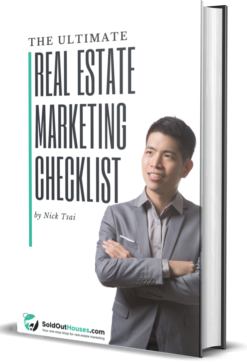Writing a sound real estate agent business plan and model is a critical aspect that real estate agents can never survive without. After all, the last thing you want is to wake up in the morning without any idea what you will do for that day.
Your real estate agent business serves as your personal guide that helps you stay on the right track as you progress in your career. Your plan should contain your goals and ways to achieve them.
What is a Real Estate Agent Business Plan?
A real estate agent business plan creates guidance and sets the foundation for income goals, goal setting, marketing strategies, understanding of the competitive landscape, and lead generation.
The plan details basic business information including your mission statement and assesses the strengths, weaknesses, opportunities, and threats (SWOT) of your organization. Business plans must also include financial calculations and measurable calculations you can revisit during the year to guarantee that you will achieve your goals.
1. Write Your Mission Statement
Your real estate agent business plan must always begin with your mission statement that identifies your values and the reason for the existence of your business. The mission statement serves as your guide to reaching the ultimate objectives of your business.
When creating an influential and strong mission statement, the rest of the items included in your business plan must be targeted at satisfying this statement.
The mission statement must identify your target market or audience, the services or products you offer, and what sets your business apart from the rest. A powerful and effective mission statement must be concise and short but still sums up the objective of the business.
2. Define Your Why
Your why or your reason why you pursued this career and started this business will serve as your foundation for how you will run your business. It is your vision and without this particular step, you might right losing your purpose which will deter and confuse your clients in turn.
Some of the things you need to ponder on include the problem you can solve for clients and your reason for wanting to succeed with your business.
When establishing your brand, during interviews, in times of stress, or even when just engaging in casual conversations, your why keeps you motivated to stand out from the crowd and push forward no matter what.
3. Perform a SWOT Analysis
The acronym SWOT standards for the strengths, weaknesses, opportunities, and threats of a business or organization. The main objective of the said four elements is to evaluate a business through an assessment of the external and internal factors that can help you make more money and drive your decision-making.
Conducting a SWOT analysis while developing your real estate agent business plan will help uncover more opportunities that will set you apart from all your existing competition on the market.
4. Set Measurable and Specific Goals
After you have clearly defined your mission and vision and performed a SWOT analysis, it is now time for you to set goals for your business. Your goals will help set the tone to improve your performance and steer your business in the right direction. The goals you set must also have a clear way of showing your progress that will serve as the key motivator to ensure that you stay on track to reaching them.
Every goal you make must follow a pattern to determine set criteria. Doing so will guarantee that your everyday efforts are done to meet the objectives of the business within a short timeframe. An easy way to do it is with the use of SMART goals.
You also need to split your goals into long-term and short-term ones. The lengths of your short-term goals may vary between several days or weeks without exceeding six months. You also need to work on these short-term goals as you work on their long-term counterparts.
Meanwhile, long-term goals are those that take up six months or more to finish and need perseverance and careful planning to achieve. Having a nice mix of long-term and short-term goals can help you stay motivated.
While all goals are equally critical, success stems from the way you prioritize each one. Add a new goal slowly as you feel comfortable with the present progress of your existing set of goals and as you gain the capacity to do so.
Not identifying your business goals is like leaving your results up to luck to achieve your business activities.
5. Identify Your Niche
If you think that all real estate agents sell houses, you might want to think again. if every agent is doing the same thing, there wouldn’t be a large market, fierce competition, or real estate influencers.
Some realtors focus on luxury single-family houses while others are experts in waterfront condos. What niche would you want to work on? Here are a few questions to answer when finding your niche:
- Are you a humble real estate agent in the suburbs or a luxury one based in the metro?
- Do you have additional certifications?
- What type of demographic do you wish to serve?
- What type of services do you offer that others don’t?
- What kinds of living spaces do you love?
The answer to these questions will help you establish your distinct brand.
6. Come Up with Marketing Tactics and Strategies
Developing and implementing marketing tactics and strategies will help you locate and identify your current value proposition in the industry together with specific execution timelines.
Aside from identifying the overall goals and objectives of your business, you also need to include the following in your marketing plan and strategy:
- Analyze your market competition
- Create a timeline and set your business plan in motion
- Estimate your projected budget for marketing
- Pinpoint your unique selling proposition
- Identify your target audience and learn your geographic farm area data
- Determine your general marketing goals
- Track your progress and adjust as necessary
Although a marketing strategy determines your business’s overall marketing goals, coming up with marketing tactics can help you reach these individual goals. These goals can include tactics for referral business, efforts on retention, and methods for new customer acquisition.
For instance, you can provide incentives to those who will refer your business who closes. You can also implement new email drip campaigns that can boost your lead conversion rates.
These strategies must also have set KPIs or key performance indicators to help you assess your performance. A KPI you can set for your business, for example, is for referral business to go beyond 20% of your existing lead generation sources.
7. Create a Lead Generation and Nurturing Strategy
A successful strategy for lead generation will help you sustain business growth. You can do it through paid ads and organically to attract and convert potential clients. Aside from lead generation, agents must have some systems in place for managing, nurturing, and re-engaging with contacts to increase opportunities.
Lead generation using a multipronged approach is an ideal method for maintaining a good lead flow. You can use common organic strategies such as reaching out to your own sphere of influence, attending networking events, and hosting an open house.
You can also use paid generation methods like buying leads from a lead generation agency or setting up a dedicated site for funneling potential clients. Your marketing tactics must be directly correlated to your lead generation tactics.
Each lead is a good opportunity even when they might not convert to a deal immediately. Nurturing leads effectively will ensure that no opportunity is amiss. Real estate agents can nurture these leads by constantly developing and engaging relationships with potential leads. You also have to provide potential clients with a regular flow of relevant and important information which depends on where they are in the process.
It will be easier to nurture leads if you implement an efficient CRM or customer relationship management tool. Many CRMs are affordable and can gather all contacts into a single easy-to-use platform.
Real estate agents can input contact details together with other necessary notes into the profile of the contact to refer back to during communication with leads.
8. Focus on Budgeting
Keeping track of your budgeting and finances is crucial to understand how to continue running your business, especially if you are an independent contractor. Keep a record of dates and categorize them to know where your money goes and where it comes from exactly.
Items you can consider when considering your budget on your real estate agent business plan include the following:
- Should you hire a transaction coordinator?
- How many houses have you sold for the past 6 months?
- How much will you spend on marketing every listing?
- What are your car expenses?
- What is your commission split?
- What is the average sales price in your niche?
Don’t forget to include the expense reviews monthly to be more familiar with your finance sheets. By doing so, you will know how to use your money and time more efficiently.
9. Compute Your Income Goal
Your income goal is another important item you should include in your real estate agent business plan. Although it might be harder for new agents who might still be trying to learn the ropes of the business, you still need to estimate how much you will earn for a year.
You can work with a professional mentor or agent to help you estimate your income goals. If you are a seasoned agent, review your past years to determine your monetary goals for the next year.
You need a few basic figure estimates to compute your income goal and how much work you need to make to reach that goal, which includes the following:
- Estimate of accomplished deals yearly
Estimate how many deals you want to complete in a year. Remember that some months won’t be as busy as others, so always consider your personal schedule, holidays, and weather.
- Fee split with brokerage
It is the agreed-upon commission split you make with your brokerage for every completed transaction. If you have a 70/30 split with your brokerage, for example, you will receive 70% of the commission while your brokerage will get 30% commission for every deal.
- Net income
Net income is the amount of money that will go into your pocket after you split the commission with the brokerage.
You can give yourself a more realistic figure for your income goal if you determine these numbers. Compute for the GCI or gross income commission or the amount of money you should make before the commission splits as well as the average profit per month and per deal you will need to achieve your goal.
10. Review Your Business Plan Regularly
A business plan won’t be effective if you don’t use it at all. Your real estate agent business plan serves as the roadmap for your business. As such, you need to revisit and review it as often as you can to ensure that you stay right on track and don’t veer on the wrong path.
Your plan should serve as a constant resource that will guide you through achieving your business objectives and goals. However, it doesn’t mean it is set in stone, though, especially if you have to make a few changes.
As a real estate agent, you have to revisit your business plan every month to help you measure and track your progress and add the necessary changes and tweaks to stay on the right path. Once you discover that you are missing some of the set times for your goals, you have to continue revisiting your business plan regularly.
Making updates to your business plant itself must be done every year after you have developed a complete picture of your yearly performance. Evaluation of your business plan will help you learn new tactics and strategies and make sure that you have the necessary resources for the coming year.
Now that you know how to write a real estate agent business plan, you will be more ready to face anything that might come your way as your business grows and expands.

I became a realtor when I was 25, Right now I’m a digital marketing expert helping realtors, brokers and real estate agents generate more leads online.




















